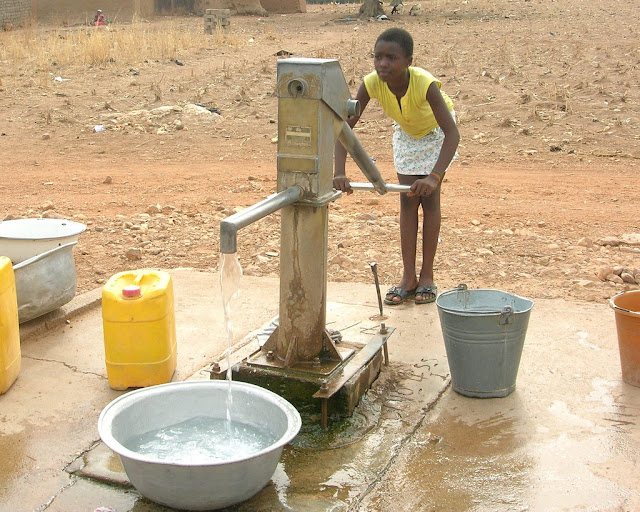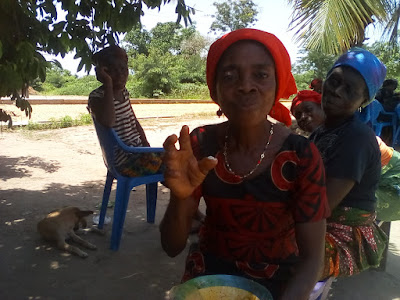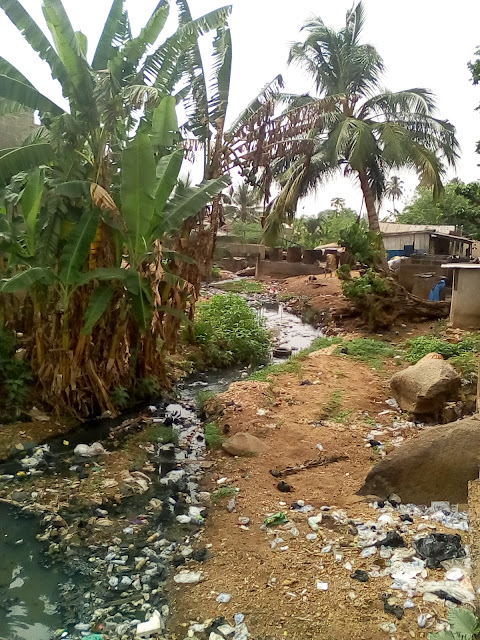Water, water everywhere, and not a drop to drink.
Most of you probably know that I'm in Ghana as a health volunteer, but I don't think many are aware of the fact that officially, I am a Health/WATSAN volunteer. WATSAN means Water and Sanitation. When I first arrived in Ghana, I wasn't quite as excited about that part of my job as I was about the other parts. I was much more interested in educating people about malaria and HIV than I was about improving water and sanitation practices.
However, the longer I am here, the more I recognize that issues with water and sanitation are a massive part of the health issues here in Ghana. For example, a lot of babies and children suffer from frequent diarrhea that could probably be prevented with regular hand washing. But if bringing water to the house entails walking five miles with a fifty pound bucket of water on your head, hand washing might not feel like such a priority. A lot of people are aware that burning trash at home is associated with respiratory issues, but if there is not government to come and manage waste disposal, what's the better alternative?
So let's talk about water.
In my community, as with most, bringing water to the house is primarily the responsibility of women and children. My community has two boreholes. They look like this:
Theoretically, the boreholes should provide clean, safe water for drinking, bathing, and cooking. However, because of the water table that my community is situated on, the water is too salty, and community members don't like using it.
Instead, community members (again, mostly girls and women) will walk outside of the community to find "fresh" water. Now, this water may not have salt in it, but it is not fresh in any other sense of the word. It is murkier than any lake or pond I've ever seen and has any number of creatures living in it: frogs, fish, snakes, and so on. Currently, there's a project going on to build a road to my community, and there is a lot of heavy equipment going back and forth, putting other pollutants into the water. Nonetheless, it's what people use to wash their clothes and bathe with. For drinking water, people are mostly reliant on rainwater, which is much cleaner. That's what I use, too, after putting it through my Peace Corps provided water filter.
Recently, the closest source of "fresh" water dried up. Now, instead of walking five minutes or so, getting water requires at least a half an hour round trip. Most people make this trip several times a day. One of my friends has recently informed me that things are going to get much worse; in the dry season, the women will be walking up to 10 miles to access water. I am pretty suspicious of this figure; ten miles seems a little high to me--I'll let you know once we get a little closer to dry season. Some people will load it into barrels and ship it on motorcycles or bikes rather than carry it, but one way or another it has to be brought those miles back to the community.
Lack of access to water is a major problem in a lot of the developing world. It's something I never really considered before coming here to Ghana. As an American, or as a citizen of the developed world in general, water isn't generally something we have to think about. It just is. Before coming to Ghana, I wouldn't have thought twice about taking a half hour long shower. As a kid, I used to run through sprinklers just for fun. Now, I'm able to bathe with two liters of water when I need to.
If you want to learn more about WATSAN issues in Ghana and other parts of the world, here are a few articles you can check out:
https://www.theguardian.com/global-development-professionals-network/2015/jul/01/global-access-clean-water-sanitation-mapped
https://thewaterproject.org/why-water/health
http://www.un.org/en/sections/issues-depth/water/
However, the longer I am here, the more I recognize that issues with water and sanitation are a massive part of the health issues here in Ghana. For example, a lot of babies and children suffer from frequent diarrhea that could probably be prevented with regular hand washing. But if bringing water to the house entails walking five miles with a fifty pound bucket of water on your head, hand washing might not feel like such a priority. A lot of people are aware that burning trash at home is associated with respiratory issues, but if there is not government to come and manage waste disposal, what's the better alternative?
So let's talk about water.
In my community, as with most, bringing water to the house is primarily the responsibility of women and children. My community has two boreholes. They look like this:
 |
| This is not actually my borehole. But it is a borehole in Ghana, and this is pretty much exactly what the boreholes in my community look like. I didn't take this picture, and I don't know who did. |
Theoretically, the boreholes should provide clean, safe water for drinking, bathing, and cooking. However, because of the water table that my community is situated on, the water is too salty, and community members don't like using it.
Instead, community members (again, mostly girls and women) will walk outside of the community to find "fresh" water. Now, this water may not have salt in it, but it is not fresh in any other sense of the word. It is murkier than any lake or pond I've ever seen and has any number of creatures living in it: frogs, fish, snakes, and so on. Currently, there's a project going on to build a road to my community, and there is a lot of heavy equipment going back and forth, putting other pollutants into the water. Nonetheless, it's what people use to wash their clothes and bathe with. For drinking water, people are mostly reliant on rainwater, which is much cleaner. That's what I use, too, after putting it through my Peace Corps provided water filter.
 |
| Some of the girls in my community making the trip to fetch water. |
Recently, the closest source of "fresh" water dried up. Now, instead of walking five minutes or so, getting water requires at least a half an hour round trip. Most people make this trip several times a day. One of my friends has recently informed me that things are going to get much worse; in the dry season, the women will be walking up to 10 miles to access water. I am pretty suspicious of this figure; ten miles seems a little high to me--I'll let you know once we get a little closer to dry season. Some people will load it into barrels and ship it on motorcycles or bikes rather than carry it, but one way or another it has to be brought those miles back to the community.
 |
| Water my community uses for bathing and washing. Not exactly the cleanest. |
Lack of access to water is a major problem in a lot of the developing world. It's something I never really considered before coming here to Ghana. As an American, or as a citizen of the developed world in general, water isn't generally something we have to think about. It just is. Before coming to Ghana, I wouldn't have thought twice about taking a half hour long shower. As a kid, I used to run through sprinklers just for fun. Now, I'm able to bathe with two liters of water when I need to.
If you want to learn more about WATSAN issues in Ghana and other parts of the world, here are a few articles you can check out:
https://www.theguardian.com/global-development-professionals-network/2015/jul/01/global-access-clean-water-sanitation-mapped
https://thewaterproject.org/why-water/health
http://www.un.org/en/sections/issues-depth/water/



Comments
Post a Comment